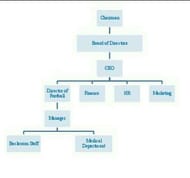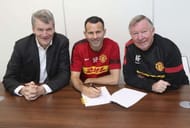Football is without a doubt the most popular sport across the world. And naturally, popular football clubs are big brands, especially the likes of Manchester United, Real Madrid and FC Barcelona. Like major brands in various industries, these brands have their own style of functioning.
Over the next few weeks, we will be taking a closer look at certain aspects of a football club like the hierarchy in place and also analyze a few roles. In addition, we will delve into the commercial side taking into consideration the cost and revenue aspects.Further, it will be interesting to see how big business football really is and what do businessmen look to obtain by investing their money in such brands.
We start off by understanding the working structure that is currently in place in most of the professional clubs across the world."
How is a football club structured?
An organization’s structure is the manner in which its workforce is categorized into specific job roles and responsibilities are delegated. The structure of an organization is to a great extent dependent on its goals and objectives. Most professional football clubs plying their trade across the globe are commercial entities looking to make profits.
In this regard, they mirror corporate organizations working in other industries. Just like a corporate setup, a football club also has at the top the Chairman and the Board of Directors. The Chairman may or may not be the owner of the club. Chelsea Football Club is owned by Russian billionaire Roman Abramovich but American lawyer Bruce Buck serves as the Chairman of the club.
The Chairman works in tandem with Board in making some of the crucial decisions regarding the functioning of the club like the appointment of a new manager, expansion of the stadium etc.
Also Read: Football Business: How clubs can be run like a business entity
However, the most important role in a football club like a corporate house is that of the Chief Executive Officer. The CEO is the one who oversees the functioning of the organization, communicating with people from various departments. In a football club, one of the chief activities of the CEO is negotiating contracts and signing new players.
Manchester United owes its glory not only to the great Sir Alex Ferguson but also David Gill who served as the Chief Executive Officer of the club for a period of thirteen years from 2000 to 2013. During his tenure, Gill worked closely with Sir Alex in signing new players and retaining some of the existing ones.
Current United CEO, Ed Woodward seems to be following in his footsteps having made some big signings this summer.
The importance and the role of the football manager is what differentiates football clubs from corporate houses. The manager is one of the most powerful and influential figures in the club. Rarely does a company have any employee lower than the CEO having such an influence over the running of the firm.
The manager of the football club is the one responsible for the results on the pitch. His work is to ensure that the targets given to him are met by the end of the season. He works closely with the CEO in trying to get new players to the club. And for a manager, two of the most important individuals are the Director of Football and the Head Scout.
The Director of Football acts as the link between the CEO and the Manager. An ex-player of the club usually occupies this position. Current Real Madrid Manager, Zinedine Zidane previously occupied this position at the club. The Head Scout is responsible for spotting new talent and bringing in new players to the existing squad.
The manager is closely assisted by the backroom staff comprising the Assistant Manager, the Goalkeeping Coach and the Physiotherapist or the Team Doctor to name a few.
The Medical Department plays an extremely crucial role. They work tirelessly with the players behind the scenes to produce the best results for the club on the pitch. Keeping the players fit over the course of the season guarantees success for the club and the employees in this department work to the best of their abilities to ensure a positive outcome.
Also Read: 5 things you probably didn't know about Chelsea owner Roman Abramovich
A large football club also has various other departments to look into the functioning of the club. The Human Resource Department looks after the well-being of the employees, the Finance Department works with CEO in handling the money and the Marketing Department aims to popularize the side and its players with a view to bringing in new sponsorships and deals to the clubs.
All the departments are intricately linked in such a football club and work closely to produce the best results for the club both on and off the pitch. In modern day football, succeeding on the pitch needs to be complemented by substantial efforts in building a brand off it. And that is why it is important to have an efficient organizational structure in place.


